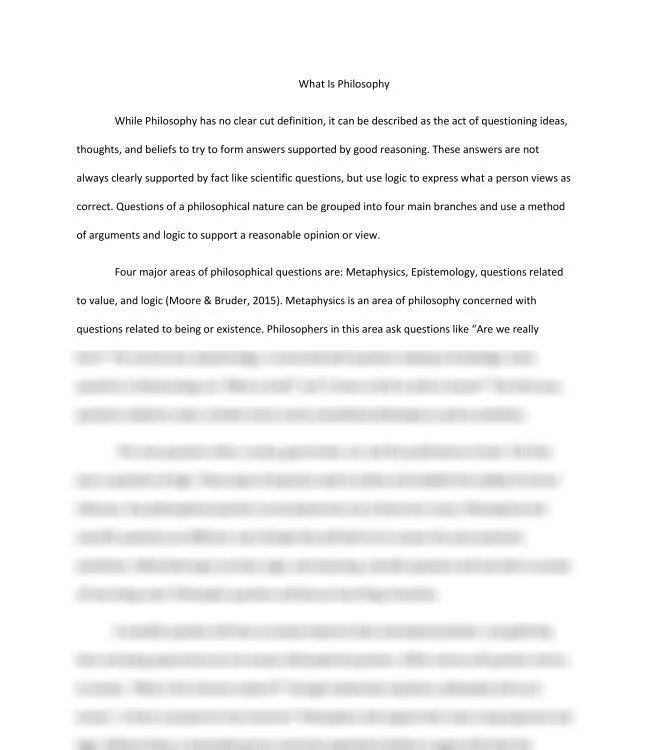What Is Philosophy While Philosophy has no clear cut definition, it can be described as the act of questioning ideas, thoughts, and beliefs to try to form answers supported by good reasoning. These a
What Is Philosophy While Philosophy has no clear cut definition, it can be described as the act of questioning ideas, thoughts, and beliefs to try to form answers supported by good reasoning. These a
& (2005). (6th (Moore (argument 2005). 2015). A An Any Argumentum B. Boston: Bruder, Epistemology Epistemology, Fallacies Four Ideas Is It Just K. McGraw-Hill Metaphysics Metaphysics, Moore, N., Not Philosophers Philosophic Philosophical Philosophy Philosophy, Philosophy: Power Questions References Some Sometimes The These This Two Universe Universe?” What When While Without a act ad aesthetics. agree all almost also always an and answer answer, answers answers, appeals are are: area area, areas areas, areas. argued argument argument. arguments art, as ask asked assumptions based be be. because begging being beliefs believe believes black-or-white both boundaries branches but by called can cannot changing, circular clear clearly common concerned conclusion conclusion. conclusions. contemplated correct correct, correct. correctly, critical criticizing cut definition, described did different, discredit discuss do doing each. ed.). either emotion emotion, emotions end equations, establish establish. ethics, even existence. expected experimentation. experiments express fact facts facts, fallacies fallacy fallacy. fears. final five for form four gathering gave giving good government, grouped happens happens. has have help her here?” herring herring, his hominem how ideas, identical if in includes incorrect incorrect. inference. instead interests into is issue it just justifications justifies keeping knowledge. known?” leaves life like limit listener’s logic logic, logic. logical logically. made main major make man man, mathematic method mind. misrepresentation mistakes mistakes, moral, more nature no no. not occur occurs of of?” on one only open opinion option or other outline part people people’s person person), philosopher philosophical philosophy philosophy, placed playing point political premise premises proven purpose push question question, question. questioning questions questions, questions. really reasonable reasoning, reasoning. reasons rebut red refuting related relating same science scientific second seek should six skills social, society society, some someone sometimes sometimes. speaks states stating. straw support supported that the their them. then there these these, they things thinking third this though thoughts thoughts, three through to tries truth?” try trying two types unrelated use using validity value, view view. views ways we well well. what when which whom why will with work. world. wrong yes “Are “Is “What
What Is Philosophy
While Philosophy has no clear cut definition, it can be described as the act of questioning ideas, thoughts, and beliefs to try to form answers supported by good reasoning. These answers are not always clearly supported by fact like scientific questions, but use logic to express what a person views as correct. Questions of a philosophical nature can be grouped into four main branches and use a method of arguments and logic to support a reasonable opinion or view.
Four major areas of philosophical questions are: Metaphysics, Epistemology, questions related to value, and logic (Moore & Bruder, 2015). Metaphysics is an area of philosophy concerned with questions related to being or existence. Philosophers in this area ask questions like “Are we really here?” The second area, Epistemology, is concerned with questions relating to knowledge. Some
